Monday Feb 23, 2026
Monday Feb 23, 2026
Wednesday, 8 November 2023 00:00 - - {{hitsCtrl.values.hits}}
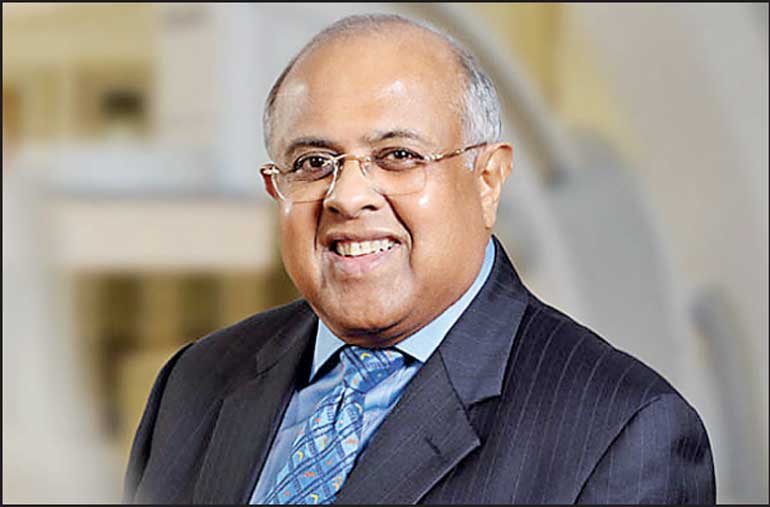
HelpAge Sri Lanka Chairman Tilak de Zoysa
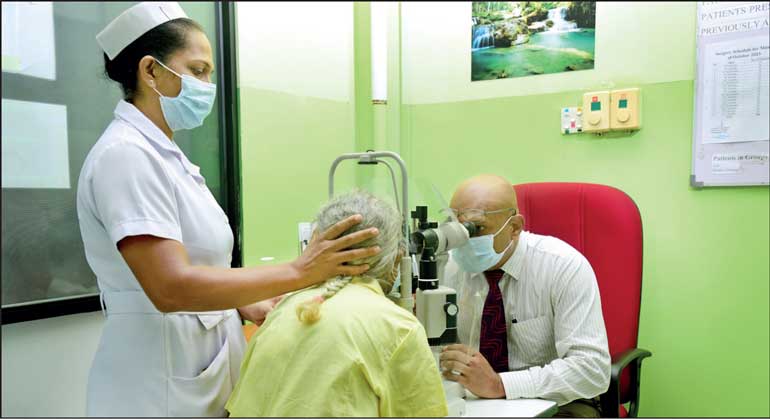
Helpage Eye Hospital
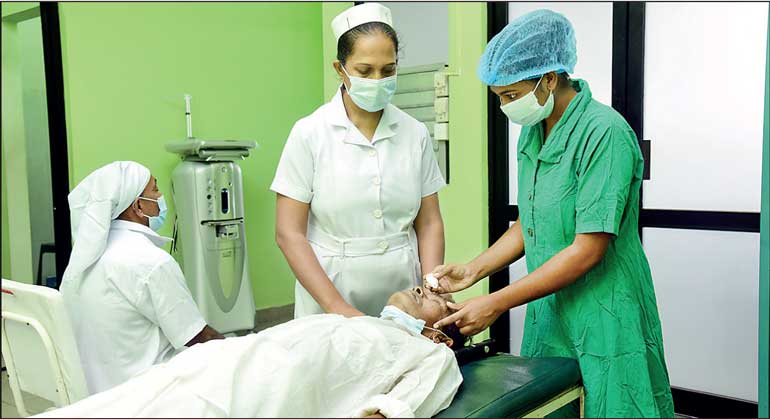
Cataract Surgery

Eye Surgery
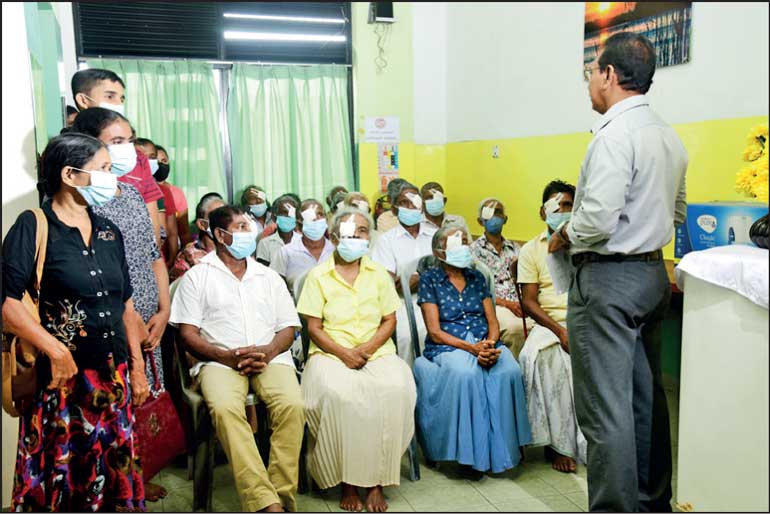
Helpage Eye Clinic
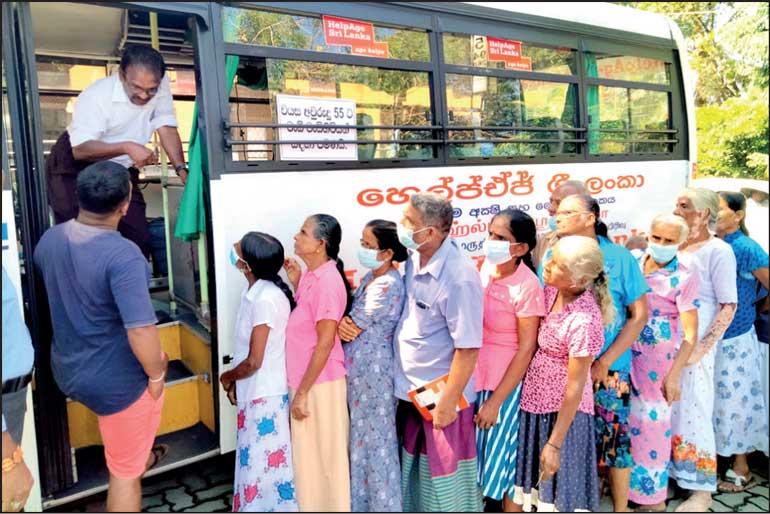
MMU Bus
In the realm of compassionate service to underprivileged senior citizens in Sri Lanka, HelpAge Sri Lanka (HASL) stands as a beacon of hope and dedication. Established in 1986, this esteemed charity organisation has been on a transformative journey, guided by its mission to enhance the lives of the elderly with unwavering commitment. At the helm of this noble cause is Tilak De Zoysa, the esteemed Chairman of HelpAge Sri Lanka. A respected business leader and philanthropist, Tilak De Zoysa has led HASL with vision and purpose, steering it toward impactful initiatives that address the multifaceted needs of the elderly and steadfast in its commitment to creating a society where older individuals can age with dignity and respect. In this exclusive interview, De Zoysa shares his perspectives on the societal and economic changes and challenges affecting the elderly, the distinctive qualities that set HelpAge Sri Lanka apart, and the meaningful contributions of donors that has helped to fuel HASL’s work and services.
Q: Can you provide an overview of HelpAge’s work, emphasising its history, vision, mission, and key projects or programs?
A: HelpAge (HASL) is a non-profit organisation with a rich history dating back to its establishment in 1986. Our mission is to enhance the quality of life for elderly individuals, and our vision is to create a society where older people can age with dignity and respect.
HASL Sri Lanka was founded by H.P. Gooneratne JP, inspired by the global attention given to the challenges of an aging population highlighted in the United Nations’ World Assembly on Aging in Vienna in 1982. Since then, we have been on a journey dedicated to addressing the needs of the elderly in Sri Lanka.
In 2010 HASL was privileged to be among the first of 60 global affiliates to achieve “sister-status” with HelpAge International (HAI) UK.
Our vision goes beyond just providing assistance; it envisions a society that values and empowers older individuals, recognising their wisdom and contributions. We believe in a Sri Lanka where every elderly person can lead an independent and dignified life.
Our initiatives include Till Collection project, Home Care Assistance program, Day Centres for senior citizens, and Training Centre. This year, under the banner of “Give the Gift of Sight: Illuminate Lives this Season with HelpAge Greeting Cards, has been launched.
Q: There has been a huge number of societal and economic changes in the last few years – how have these changes affected the underserved elderly population In Sri Lanka?
 A: Yes, the recent societal and economic changes have presented both challenges and opportunities for the underserved elderly population in Sri Lanka.
A: Yes, the recent societal and economic changes have presented both challenges and opportunities for the underserved elderly population in Sri Lanka.
The economic landscape has undergone significant shifts, and unfortunately, the underserved elderly is disproportionately affected. Many older individuals, especially those without substantial financial support, face increased economic hardships. The rising cost of living, inflation, and changes in employment structures have made it challenging for them to meet their basic needs.
With changes in the healthcare system, access to healthcare has become more complex. Underserved elderly individuals may find it difficult to access essential medical services, bear the costs for escalating medicinal expenses and the demand for specialised care, especially for age-related issues.
The rapid advancement in technology and the move towards digital platforms for essential services have created a digital divide, leaving many elderly individuals isolated. Those without access to digital devices or the necessary skills may struggle to connect with their communities, access information, or even schedule medical appointments.
The changes in societal dynamics, including migration of family members as a result of the recent economical backlash, have contributed to increased social isolation among the elderly. Many of them depend on family and community interactions for emotional well-being, and disruptions to these social circles have taken a toll on their mental health.
On the flip side, these changes have also highlighted the importance of community and social support. Organisations like HASL play a crucial role in bridging gaps and providing assistance. Our programs, such as Day Centres for Senior Citizens, formation and capacity building of elder’s club and Home Care Assistance, aim to counteract the negative impacts of social isolation by creating spaces for interaction and offering essential services at home.
The changing landscape has prompted a reevaluation of societal structures, including policies related to elder care. HASL actively engages in advocacy to influence policies that benefit the elderly. This involves working closely with Government bodies to ensure the rights and well-being of the elderly are prioritised.
In essence, while the recent changes have posed challenges, they have also underscored the importance of support systems and the need for targeted interventions for the underserved elderly population. Through our multifaceted programs, HASL strives to address these challenges and create a more inclusive and supportive environment for older individuals in Sri Lanka.
Q: How is HelpAge Sri Lanka navigating the challenges and seizing opportunities presented by the rising aging population and the evolving healthcare landscape in the country, and what initiatives are in place to ensure a holistic and person-centred approach to elder care?
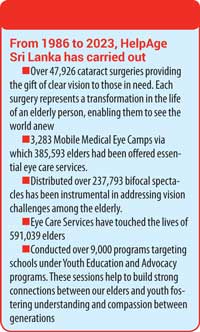 A: The COVID-19 pandemic in 2019 and the economic crisis in 2022 had a negative impact on the elderly population in Sri Lanka. Currently, 12.3% of Sri Lanka’s elderly population is 60 years and older, making it the South Asian country with the highest population of older adults.
A: The COVID-19 pandemic in 2019 and the economic crisis in 2022 had a negative impact on the elderly population in Sri Lanka. Currently, 12.3% of Sri Lanka’s elderly population is 60 years and older, making it the South Asian country with the highest population of older adults.
As we stand at the crossroads of a burgeoning aging population and a transformative era in healthcare, HASL sees this juncture as a unique opportunity to redefine the narrative of elder care in the country. Addressing the challenges posed by an aging demographic requires an unwavering and sustained commitment to collaboration and compassionate care. The transition from a youth bulge to an aging society presents numerous economic, health, and social challenges. The number of retiring workers will increase, while the incoming workforce will decrease, leading to lower productivity, reduced taxes, national income, and hindered growth. An aging population will strain the country’s healthcare services, and the inadequate social protection for the elderly leaves many vulnerable workers without income in retirement, especially as only half of those eligible are covered by the social pension.
nBeyond immediate medical interventions, HASL’s commitment extends to comprehensive training programs. The free Age Care Training programs serve a dual purpose by providing lucrative employment opportunities for Sri Lankan individuals and simultaneously training caregivers to deliver tailored assistance at their doorstep. This initiative fosters a culture of empathy and understanding, recognising the pivotal role of human connection in elder care.
*Envisioning a future of compassionate care: As HelpAge Sri Lanka embarks on this transformative journey, HASL envisions a future where healthcare transcends traditional boundaries, embracing and uplifting every individual, regardless of age. The road ahead is not without challenges, but with collaborative efforts, HASL strives to create a future where compassionate care is the cornerstone of healthcare for all ages.
Q: In a landscape where various organisations serve the elderly, what sets HelpAge Sri Lanka apart?
A: Certainly, in our more than three decades of service, HASL has carved a unique niche in the realm of elderly care.
Specialisation in aging issues: Our entire infrastructure, programs, and expertise are tailored to address the specific needs and challenges faced by the aging population. This specialisation allows us to delve deep into the intricacies of elderly care. With over 38 years of dedicated service, we bring a wealth of experience and a proven track record. We adopt a holistic strategy that encompasses healthcare, emotional well-being, social inclusion, and economic empowerment. This comprehensive care model sets us apart in ensuring the overall well-being of the elderly.
Community-centric programs: HASL places a strong emphasis on community involvement. We actively engage with local communities, empowering them to be part of the process.
Advocacy and policy influence: We take on an advocacy role to influence policies that impact the elderly at a systemic level. We believe in addressing not only the immediate needs of the elderly but also contributing to broader societal changes that promote their rights and well-being.
Sustainability and resilience: We don’t just provide temporary relief but strive to create lasting changes. This resilience-driven approach ensures that the impact of our initiatives endures over time.
In essence, what sets us apart is our commitment, specialised expertise, community-centric focus, and the ability to evolve with the changing needs of the elderly
Q: What has been the impact of key HelpAge projects – can you share a statistical overview?
A: We have been able to create a remarkable impact due to the kindness and generosity of our donor community on the lives of the elderly through key HASL projects. If we take a statistical overview from 1986 to 2023:
Over 47,926 cataract surgeries have been conducted to date, providing the gift of clear vision to those in need. Each surgery represents a transformation in the life of an elderly person, enabling them to see the world anew
Mobile medical eye camps: Through 3,283 Mobile Medical Eye Camps, we’ve reached out to 385,593 elders, offering essential eye care services. These camps are a testament to our commitment to taking medical assistance directly to those who may face barriers in accessing healthcare.
Bifocal spectacles: Distributing over 237,793 bifocal spectacles has been instrumental in addressing vision challenges among the elderly. These spectacles enhance not only their vision but also their overall quality of life.
Comprehensive eye care services: Our Eye Care Services have touched the lives of 591,039 elders. This comprehensive approach encompasses a range of services, from eye examinations to surgical interventions, ensuring holistic care for those in need.
Youth Education and Advocacy programs: We have conducted over 9,000 programs targeting schools since 1986. These sessions help to build strong connections between our elders and youth fostering understanding and compassion between generations.
Donor support has been the driving force behind these impactful projects, creating a positive ripple effect that extends far beyond statistics—into the hearts and lives of those we serve. They have been the catalyst for change and compassion!
Q: Over the years, HelpAge Sri Lanka has garnered recognition for its work. Could you highlight some of the awards and accolades the organisation has received?
A: Certainly, HASL takes pride in the acknowledgment and appreciation it has received for its dedicated efforts in serving the elderly. Some of the notable awards and recognitions:
USA-based Business World International Organization (BWIO) awarded its ‘Lifetime Achievers Award’ to HelpAge Sri Lanka in 2023. HASL also received the BWIO award for the ‘Most Service Oriented Organization in Sri Lanka’ for the third consecutive year for services rendered to the senior citizens in the country from BWIO.
The HelpAge Global Network also won the Conrad N Hilton Humanitarian Award in 2012, during my Chairmanship at HelpAge International UK. These are acknowledgments of our position as an integral part of a broader movement dedicated to the well-being of the elderly worldwide.
Government commendations: The Executive Director of HelpAge Sri Lanka Samantha Liyanawaduge is a member of the National Council on Elders, under the purview of the Ministry of Social Services. This appointment made by the President is an endorsement of the leadership given by HASL in elevating the lives of the underserved elderly, as a valued partner in the broader societal framework.
Q: What factors contribute to the growth of the Sri Lanka elderly care market?
A: The Sri Lanka elderly care market is on the rise due to a growing senior population and an uptick in chronic diseases. The World Health Organization predicts a billion seniors in emerging nations by 2050, driving the demand for elder care services. Valued at $ 832.8 billion in 2021, it’s projected to reach $ 1,268.43 billion by 2029.
Increasing geriatric population and a surge in chronic diseases boost demand for senior care, especially home healthcare services. Growing older population fuels the need for aged care services, emphasising both short-term and long-term support. However, the high cost of eldercare services poses a restraint, impacting their widespread utilisation.
COVID-19 impact: The pandemic initially reduced demand, but post-COVID, there’s an increased need for aged care services, reflecting changes in preventive measures. Be it product type, service or application, the market offers significant growth opportunities and challenges, hence the importance of accessible and affordable aged care services.
Q: How can individuals from the public actively contribute to and support the causes that HelpAge prioritises?
A: Financial contributions, whether one-time or regular, play a crucial role in supporting projects and initiatives since we are dependent on public funding. This could involve sponsoring eye camps, providing funds for cataract surgeries, or donating for the purchase of aged care-related products like wheelchairs, crutches, and hearing aids
Volunteerism offers an opportunity to directly impact lives by offering time and skills in areas such as mobile eye camps, day care centres, fundraising events, and more. Engaging with HelpAge through volunteer work allows individuals to witness the immediate effects of their efforts on the lives of the elderly.
Another impactful and meaningful way to contribute is through the purchase of HASL greeting cards. The proceeds from these sales often go towards specific projects, such as funding free cataract surgeries for the visually impaired.
Participation in fundraising events, whether online or offline, is an active way to generate funds for critical projects.
Spreading awareness about HASL’s mission, the challenges faced by the elderly, and the organisation’s accomplishments is a valuable contribution. Individuals can use their networks, both online and offline, to amplify HASL’s reach, garnering more support and resources for their projects.
Q: Who makes up the HelpAge Sri Lanka Council?
A: The HASL Council comprises dedicated individuals committed to the welfare of senior citizens. I serve as the Chairman, and the Deputy Chairman is Deshabandu Ajit Jayaratne. Other Council Members include Nimal Dias Jayasinha, Nishantha Gooneratne, Deshabandu Jezima Ismail, Sanjeev Gardiner, Dr. C.P. Banagala, Anosha Subasinghe, Yasmin Raheem, Maithri Wickremesinghe, Dr. C.P. Banagala and Krishan Balendra. Each member brings a wealth of experience and expertise, contributing to HelpAge’s commitment to enhancing the lives of senior citizens. The HelpAge Management team and staff are led by Executive Director Samantha Liyanawaduge. The collective efforts of the council, management team, and staff guide HelpAge in achieving our mission of improving the quality of life for older individuals and empowering them to live with dignity.